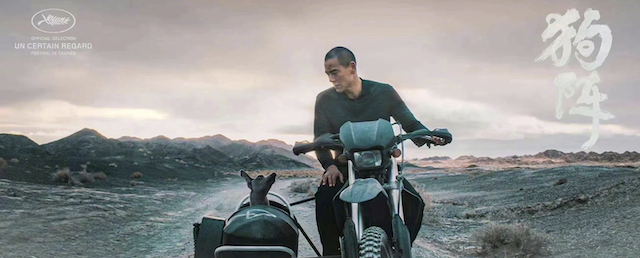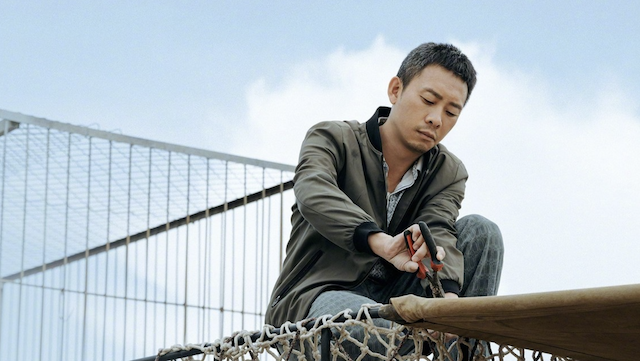
©Courtesy of Huayi Brothers
The most surprising characters can often embark on the road to redemption in movies fueled by grandeur realism. The new dark comedy, Black Dog, is one such heartwarming feature that’s driven by its equally grandiose sentimentality and stark absurdism of its titular character.
Chinese filmmaker Guan Hu directed the intimate tale from a script he co-wrote with Rui Ge. The scribes crafted a soulful homecoming odyssey in the movie, which is presented in Mandarin with English subtitles, and is set on the windswept fringes of the Gobi Desert.
Black Dog, which is set in 2008, follows Lang (Eddie Peng) as he emerges from a decade-long prison sentence for his involvement in a murder. Upon his release, he returns to his small hometown in Northwest China and is hired to work on a dog-catching patrol. He’s tasked with cleaning up an outpost in the Gobi desert, in preparation for the upcoming Beijing Summer Olympics.
While working for the local dog patrol team to clear the town of stray dogs before the Olympic Games, he strikes up an unlikely connection with the titular black dog. These two lonely souls then embark on a new journey together.
As Lang decides to adopt the dog, the animal gives the human relief from his problems. One of his main troubles is his struggle with the repressed guilt he has felt since the incident that led to his imprisonment.

©Courtesy of Huayi Brothers
Lang also has to contend with his alcoholic father remaining attached to the remnants of the nearby soon-to-be-demolished zoo, where he now lives. Local kingpin Butcher Hu is also causing tension in the community by seeking justice for Lang’s part in his nephew’s death, which led to his prison sentence.
But Butcher is going to need money to carry out his revenge. So when he realizes that there is a bounty on his enemy’s new black dog, he sets out to catch the animal and claim the money. But when Butcher eventually returns bruised and bitten, Lang realizes that his new dog is a much more clever adversary than he could have ever imagined.
The eponymous dog is an emotional, communicative individual, much like the dark comedy’s human protagonist, as they’re both fighting loneliness and prejudice. The dog and Lang both find redemption through their bond as they embark on an insightful journey together.
Black Dog operates in a vein of stifling realism, as Peng gives a powerful portrayal of Lang during his harrowing circumstances. The actor brings Hu’s gripping tale of contemporary social commentary, particularly the reflection of how his hometown is barely able to maintain itself, to the screen.
The project also maintains the tradition of classic film noir. Much like other anti-heroes in the genre, Lang is showcased as a desperate criminal protagonist who’s struggling to escape his seemingly predetermined fate. Lang and his new canine companion represent the dispossessed people and animals who have been left behind by the advancement of China’s economy.
But Guan’s script and directorial approach gives some of the movie’s more tragic scenes a Buster Keaton comedic quality that ultimately lighten the mood of the entire project. Despite the harrowing conflicts Lang finds himself in, the spontaneous humor that arises from their tension inspires the anti-hero to fight for his survival.
Black Dog‘s cinematographer, Gao Weizhe, utilized a superb aspect ratio to highlight Lang’s emotions and struggles throughout the story. The dark comedy’s widescreen images, which are tinted in dust and washed-out colors, showcase Lang and his dog’s difficult journey through the vast uninhabited cityscapes and surrounding desert. The film’s epic, dark-toned visual aesthetic emphasize how the area has been forgotten while the rest of China prepares to host, and succeed in, the Summer Olympics.
Weizhe’s signature widescreen shots are immediately introduced during the movie’s striking opening setpiece. The sequence encompasses the characters and locations in the cinematographer’s bleach-bone splendor.
The dark comedy’s opening shots set the tone for the rest of the story. Such notable touches in the beginning scenes include the sky being presented as the color of acid-washed denim, with the mountains set against it appearing forbidding in the background.
Black Dog is a passionate entry in the subgenre of international films that treat their canine characters with just as much depth and artistry as their human counterparts. Guan’s pivotal entry in the subgenre also achieves a delicate balance between drama and deadpan comedy. That balance is enhanced by both Peng and his canine co-star’s passionate yet physically expressive performances, which are capture by Weizhe’s brilliant cinematography.
The film’s mix of realistic sentimentality and stark absurdism make it a soul-filling homecoming odyssey that’s relatable to the entire world, despite being set on the isolated fringes of the Gobi Desert. The movie is a classic story of the redemption of a down-on-his-luck hero who’s working towards recovery in an abandoned town where dreams never quite came true.
Overall: A
Black Dog had its world premiere at the 77th Cannes Film Festival in May, where it won the Un Certain Regard prize. The dark comedy went on to have its American Southeast premiere earlier this month at the Fort Lauderdale International Film Festival.
If you like the review, share your thoughts below!

